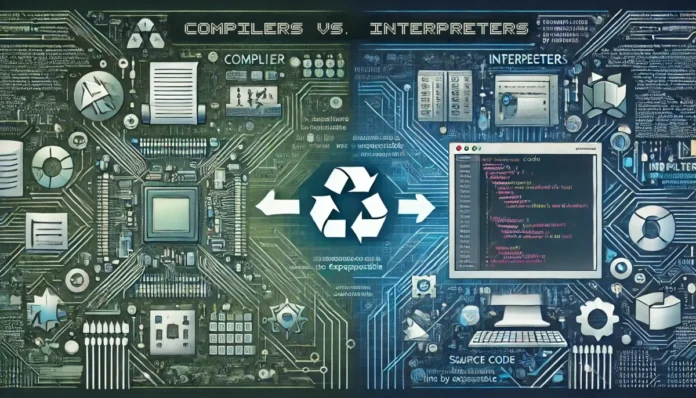
What is interpreter
The Interpreter can be called as a systems software So that has the ability to read and execute the program’s, rather than you can say that the interpreter program’s. This interpretation consist’s of the high-level languages source code, pre-compiled and script program’s
Meaning Of Interpreter
An interpreter is a program that reads and executes the code. So It Is The consist’s of The source code, pre-compiled code and script’s. To The Common interpreter included Python, Perl, and the Ruby Interpreter’s, So In which execute The Python, Perl and Ruby code The respectively.
Interpreter:
It is to be noted that, the interpreter interprets the program line-by-line, which means that it translates one statement at a time. So In This features make’s it easier for the programmer’s to check a particular line at the time of the debugging, but slow the overall time executions of the entire programs.
The Interpreter’s and compiler’s are The similar, as they both the recognize and processing the source code. However, a compiler does not execute the code like a Interpreter does. So Instead, a compiler can convert’s the source code into a machine code, In which can be run the directly by the operating systems as an executable programs. The Interpreter’s bypassing the compilations the process and execute the code directly.
The Since interpreter read and execute the code in a single steps, they are useful for running the script’s and other small program’s. Therefore, Interpreter is a usually installed on a web server, which allow to developer’s to run the executable script’s within their web page. These script’s can be easily edit and saved without the needed to recompile the code.
While Interpreter offers many advantages for running small programs, Interpreted languages also have some limitations. So The most notable facts is that the interpreter code is required and interpreter to the run. Therefore, without an interpreter, the source code act’s as a plain text files instead of an executable programs. The Additionally, program’s composed for a translator will be unable to utilize worked in frameworks capacity’s or getting to the equipment program’s, for example, a gathered program’s. Along these lines, the greater part of the product application’s are interfered with instead of arranged.
Interpreter vs Compiler
The Compiler and Interpreter are two different way’s to execute a programs written in a programming or scripting languages.
A compiler take’s the entire programs and convert’s it into the object code that is usually stored in a files. The Object code is also referred to as a binary code and can be directly executed by the machines after the linking. Example of compiled programming language’s are The C ++ and C.
So The mediator legitimately executed The guidance’s Of written in the programming code or the scripting language’s without the changing over Of them to the item’s code or machine’s code. Case of interfered with language’s are Python, Perl and Matlab.
To Following are some interesting fact’s about The Interpreter and Compiler.
1) Both The compiler and translator convert the source code (text record) into token’s, both can create the parse tree, and both can produce the moment instruction’s. The basic difference is that a compiler systems, to consisting of a (built-in or separate) linkers, generate’s a stand alone machines code of the programs, while an interpreter systems perform’s the action descriptor by the high-level programs.
2) So Once a programs is compile, its source code is not the useful for running the code. For the interrupted program’s, the source code is required to run the programs every time.
3) So In The general, interrupted program’s run slow than compiled program’s.
4) The Java programs is first compiled into an intermediate form, To then the interpolated by the interpreter.
Difference Between An Translator And A Interpreter
To The Many peoples getting confused as to the difference between an translator and a interpreter. There is a common tendency to think the translator is interpreter, or interpreter, for the translator.
In fact, there are 2 different task’s that the require different skill’s.
So In the order to understand who and / or what as an interpreter as opposed to a translator, So we determine the main difference between interpretation and the translation.
To The Interpreter – The Programming language’s are implemented in 2 way’s: Interpretation and compilation. As the name of suggests, the interpreter transform’s or interpret’s a high-level programming code into a code that can be understood by the machines (machines code) or into an intermediate languages that can also be easily execute.
So The interpreter read each statements of the code and then directly convert’s or execute’s it. The contrasts, an assembler or the compiler can converted a high-level source code into a native (compiled) code that can be directly accessing by the operating systems.
The most of the cases, a compiler is more favorable because it is production run much faster than line-by-line interpretation. However, since interpretation is per line or statements, So it can be stopped in between execution’s to allows the code modifications or debugging. Both have their advantages and disadvantages. In This imply they can be utilized in the conjunctions as the most incorporated improvements condition’s utilize both assemblage and interpretation for the some significant level language’s.
This material was given by akdoogle.com/ just for instructive/educational purposes .Administrator isn’t liable for its content.Follow us via web-based networking media/download application to keep awake to date with our product refreshes!











